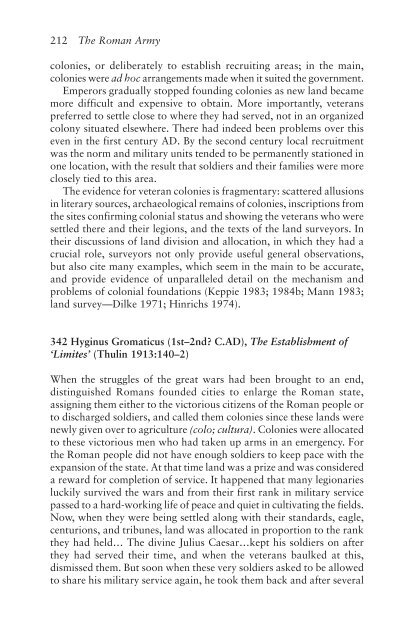The Roman Army, 31 BC–AD 337: A Sourcebook
The Roman Army, 31 BC–AD 337: A Sourcebook
The Roman Army, 31 BC–AD 337: A Sourcebook
Create successful ePaper yourself
Turn your PDF publications into a flip-book with our unique Google optimized e-Paper software.
212 <strong>The</strong> <strong>Roman</strong> <strong>Army</strong><br />
colonies, or deliberately to establish recruiting areas; in the main,<br />
colonies were ad hoc arrangements made when it suited the government.<br />
Emperors gradually stopped founding colonies as new land became<br />
more difficult and expensive to obtain. More importantly, veterans<br />
preferred to settle close to where they had served, not in an organized<br />
colony situated elsewhere. <strong>The</strong>re had indeed been problems over this<br />
even in the first century AD. By the second century local recruitment<br />
was the norm and military units tended to be permanently stationed in<br />
one location, with the result that soldiers and their families were more<br />
closely tied to this area.<br />
<strong>The</strong> evidence for veteran colonies is fragmentary: scattered allusions<br />
in literary sources, archaeological remains of colonies, inscriptions from<br />
the sites confirming colonial status and showing the veterans who were<br />
settled there and their legions, and the texts of the land surveyors. In<br />
their discussions of land division and allocation, in which they had a<br />
crucial role, surveyors not only provide useful general observations,<br />
but also cite many examples, which seem in the main to be accurate,<br />
and provide evidence of unparalleled detail on the mechanism and<br />
problems of colonial foundations (Keppie 1983; 1984b; Mann 1983;<br />
land survey—Dilke 1971; Hinrichs 1974).<br />
342 Hyginus Gromaticus (1st–2nd? C.AD), <strong>The</strong> Establishment of<br />
‘Limites’ (Thulin 1913:140–2)<br />
When the struggles of the great wars had been brought to an end,<br />
distinguished <strong>Roman</strong>s founded cities to enlarge the <strong>Roman</strong> state,<br />
assigning them either to the victorious citizens of the <strong>Roman</strong> people or<br />
to discharged soldiers, and called them colonies since these lands were<br />
newly given over to agriculture (colo; cultura). Colonies were allocated<br />
to these victorious men who had taken up arms in an emergency. For<br />
the <strong>Roman</strong> people did not have enough soldiers to keep pace with the<br />
expansion of the state. At that time land was a prize and was considered<br />
a reward for completion of service. It happened that many legionaries<br />
luckily survived the wars and from their first rank in military service<br />
passed to a hard-working life of peace and quiet in cultivating the fields.<br />
Now, when they were being settled along with their standards, eagle,<br />
centurions, and tribunes, land was allocated in proportion to the rank<br />
they had held… <strong>The</strong> divine Julius Caesar…kept his soldiers on after<br />
they had served their time, and when the veterans baulked at this,<br />
dismissed them. But soon when these very soldiers asked to be allowed<br />
to share his military service again, he took them back and after several



